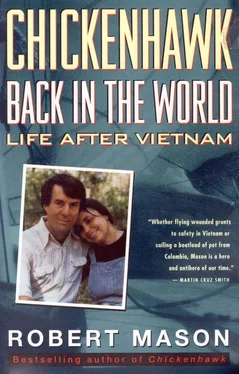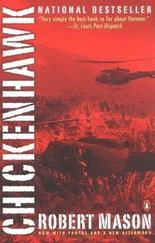Robert Mason - Chickenhawk - Back in the World - Life After Vietnam
Здесь есть возможность читать онлайн «Robert Mason - Chickenhawk - Back in the World - Life After Vietnam» весь текст электронной книги совершенно бесплатно (целиком полную версию без сокращений). В некоторых случаях можно слушать аудио, скачать через торрент в формате fb2 и присутствует краткое содержание. Год выпуска: 2013, Издательство: BookBaby, Жанр: Старинная литература, на английском языке. Описание произведения, (предисловие) а так же отзывы посетителей доступны на портале библиотеки ЛибКат.
- Название:Chickenhawk: Back in the World - Life After Vietnam
- Автор:
- Издательство:BookBaby
- Жанр:
- Год:2013
- ISBN:нет данных
- Рейтинг книги:3 / 5. Голосов: 1
-
Избранное:Добавить в избранное
- Отзывы:
-
Ваша оценка:
- 60
- 1
- 2
- 3
- 4
- 5
Chickenhawk: Back in the World - Life After Vietnam: краткое содержание, описание и аннотация
Предлагаем к чтению аннотацию, описание, краткое содержание или предисловие (зависит от того, что написал сам автор книги «Chickenhawk: Back in the World - Life After Vietnam»). Если вы не нашли необходимую информацию о книге — напишите в комментариях, мы постараемся отыскать её.
Chickenhawk: Back in the World - Life After Vietnam — читать онлайн бесплатно полную книгу (весь текст) целиком
Ниже представлен текст книги, разбитый по страницам. Система сохранения места последней прочитанной страницы, позволяет с удобством читать онлайн бесплатно книгу «Chickenhawk: Back in the World - Life After Vietnam», без необходимости каждый раз заново искать на чём Вы остановились. Поставьте закладку, и сможете в любой момент перейти на страницу, на которой закончили чтение.
Интервал:
Закладка:
I gimped out of the hospital on crutches, feeling faint. Dad had never been to Europe before. He took me to his hotel and then out to dinner. I said I wasn’t feeling well enough to eat or even sit up, but he insisted—can’t heal if you don’t eat and aren’t active. Besides, how many times did he find himself in Lisbon, after all? Let’s have fun! I sat at a table, my head propped on the heels of my hands, watching him eat, feeling sick. He offered me whiskey; I almost barfed. Water. Only water. That night, I woke up every time my father got up to slug down a drink—full glasses of straight whiskey that would kill most people. Surprised: my dad was a drunk, too.
At the VA hospital in Gainesville, they said my hip socket was fractured. I could either stay in the hospital for a month or stay home, on my back, knees up, immobile. Patience said it would be easier if I was home even though it meant she’d have to nurse me. Patience got a job at a bookstore and took care of me: food, bedpan, the whole bit. I felt like a fool. I fell in love with the nurse.
I got out of bed a month later and spent another six weeks on crutches. When the knives I’d bought in Spain arrived, I drew up an ad for—here comes the result of our painstaking research into how to sell stuff by mail—the Elks magazine. My dad, an Elk, thought that would be a great market and he paid for the ad. We sold thirty knives in two months, which, at four dollars apiece, is bad, even in Nepal.
Patience, who likes to share my interests, tripped over one of my crutches one day while I was making ads for knives and broke her toe.
When I finally got rid of the crutches, I decided to get a job painting apartments because it was there. It paid five dollars an hour, a fortune compared to what I was making as a self-employed knife importer. I made myself a good painter. I got to the apartment complex we painters were painting at seven and slopped paint around the baseboards and stuff till three. After a week, I began to get crazy. My mind screamed, this is it? a college degree and you’re fucking painting apartments? After three weeks, in the middle of trimming a doorway, I dumped the brush in the paint bucket and stomped off the job. I could be doing anything on earth besides this.
I decided to make a teepee and we’d live in that. I explained to Patience: Okay. If I can’t make enough money, then I can reduce our overhead. Jack thought this was a great idea, but Patience looked at me wistfully. Nope. I’ve decided to do this. Nothing can stop a good plan; this’ll work, I promise. I got a permit to chop down cypress trees on Georgia-Pacific land. I hacked around in the swamps for a week and got together seventeen poles. Got a book on how to build teepees. Set the frame up in our backyard and stared at it proudly. It was thirty feet tall and twenty feet across. I could see there’d be plenty of room for us. Then I saw how much canvas it would take to cover it. Problem: I knew what canvas cost. I just stared at the frame for a while, defeated. Hell of thing: can’t even afford to live like an Indian. Patience came out and gently said, “Bob, you know, I don’t really want to live in a teepee.” She was just trying to be nice. I knew she’d love it, really.
I decided to sell cars. I figured I could do that. I went to each car dealer in Gainesville and told them I wanted to sell cars. The Ford dealer hired me.
Hire is a loose-fitting word when talking about this kind of work. They paid a draw against commissions on your sales. The draw was about $85 a week in 1972 and was designed to keep a salesman alive when his luck was low. You could get your draw for a month or two of no sales, but if you weren’t selling after that, they’d fire you. The car salesman’s motto is: If business is slow, make business. Or else.
One day, business was so slow and the weather was so hot and humid, the salesmen were too lethargic and bored to even get up the energy to bullshit. By this time, however, I was the number three salesman out of twenty. I was in my prime, eager to make business when business was slow. I saw a painter outside climbing a ladder. I went out and watched him working for a while.
“You need a new van,” I said to the guy on top of the tall ladder. “I mean, I saw your van.”
The guy looked down at me. I wore a short-sleeved shirt, a tie, and polyester slacks. “I know I need a van. I don’t have the money,” he said, turning back to his work.
“No money? No problem.”
“Huh?”
“You say you have no money, right?”
“That’s right.”
“No problem. We have some great used telephone company vans. I can arrange a loan for you. All you need is a small down payment.”
“How small?”
“Let’s see.” I calculated, using car-salesman training: We took in a fleet of these junker vans from Southern Bell on trade. Worth maybe a hundred and a half wholesale. Company wanted three. “On a nine-hundred-dollar loan, they’d want a hundred and a half down.”
“Don’t have it.” The guy went back to work. Normally I’d quit screwing with such dismal prospects, but there was absolutely nothing else to do except sit inside and swelter and smoke cigarettes and try to work up some interesting car salesman stories with the other salesmen.
“No problem.”
“What do you mean, no problem? I don’t have any money!”
“You don’t have any money, right?”
“That’s what I said.”
“No problem. We go to a loan company—friend of mine—and borrow the down stroke!”
“You can do that?”
“Why not?”
The guy shook his head, painted a few strokes, while I waited on the sidewalk. He looked down. “If you can do all that, I’ll buy the damn thing.”
I made enough money to buy the stuff we needed and pay the rent. Plus I had my choice of new cars to drive. I hated it. This was rear echelon, black-market-motherfucker work.
I decided to join the Army Reserves. Maybe I could fly helicopters again. Needed current flying time for a job. If I flew again, I’d be happier, stop drinking so much. Wouldn’t need Valium, either. There were no aviation units in Gainesville. The closest one, in Jacksonville, didn’t need pilots. I join the Gainesville Army Reserve, planning to transfer later.
The reserve guys were mostly pissed off because they’d joined the reserves to avoid Vietnam; and in 1973 the goddamn war was over but they had another five years to put in. I thought this was funny as hell. Tough break, warriors. My unit was a finance company. They didn’t know what to do with a chief warrant officer pilot at first, but they decided to send me to school at Fort Benjamin Harrison, Indiana, to learn how to be a unit personnel technician, UPT. I would be a UPT, if that was what it took to fly again.
For about six weeks, I was once again an active-duty warrant officer. This time, though, I was on an administrative mission, as they called it.
The pay was much better than I’d gotten in combat.
I went to summer camp with the warriors. With all my medals, I looked like Audie Murphy to them. Another unit was at camp, an aviation unit. I went for a visit. The pilots were like me, real people. One asked me if I’d like to try it again.
We got into a Bell Loach (LOH—light observation helicopter). I’d never flown one of these things. I put on a flight helmet for the first time in years. Familiar sound: turbine whines, cries to fly. Rotors blur, whop, whop, whop. The pilot said: “Go ahead. Take it up.” I lifted the collective, felt myself floating again. Is there anything as magical? Leaned forward and we skimmed over the ground and I leapt into the sky. I rolled and wheeled through the air, seeing the earth as it is, feeling ecstasy for twenty minutes. God wanted me to fly. Pilot said we had to go back. I nodded. Came back to the grass field. Some of the warriors had come to watch. I flew close to the ground, came to a hover. I sat there floating, not wanting to ever touch the earth again. I turned. Hovered to the parking spot. The ground pulled me down.
Читать дальшеИнтервал:
Закладка:
Похожие книги на «Chickenhawk: Back in the World - Life After Vietnam»
Представляем Вашему вниманию похожие книги на «Chickenhawk: Back in the World - Life After Vietnam» списком для выбора. Мы отобрали схожую по названию и смыслу литературу в надежде предоставить читателям больше вариантов отыскать новые, интересные, ещё непрочитанные произведения.
Обсуждение, отзывы о книге «Chickenhawk: Back in the World - Life After Vietnam» и просто собственные мнения читателей. Оставьте ваши комментарии, напишите, что Вы думаете о произведении, его смысле или главных героях. Укажите что конкретно понравилось, а что нет, и почему Вы так считаете.












